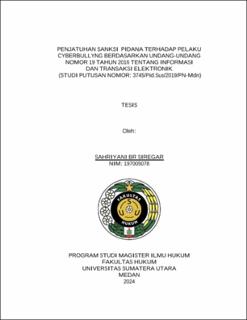Penjatuhan Sanksi Pidana terhadap Pelaku Cyberbullyng Berdasarkan Undang-Undang Nomor 19 Tahun 2016 tentang Informasi dan Transaksi Elektronik (Studi Putusan Nomor: 3745/Pid.Sus/2019/PN-Mdn)
Imposition of Criminal Sanctions on Perpetrators of Cyberbullying Based on Law Number 19 of 2016 Concerning Electronic Information and Transactions (Case Study of Decision Number: 3745/Pid.Sus/2019/PN-Mdn

Date
2024Author
Siregar, Sahriyani Br
Advisor(s)
Ekaputra, Mohammad
Trisna, Wessy
Metadata
Show full item recordAbstract
The advancement of technology has significantly facilitated human life. One prominent technology is the smartphone, which not only eases daily activities but also "indulges" users, sometimes becoming a tool for criminal acts such as cyberbullying. Cyberbullying involves actions such as insulting, mocking, and even threatening individuals on social media, performed by one or more persons or entities with specific intentions. Essentially, cyberbullying is a subset of bullying and represents a criminal act in the realm of information and communication technology, thus falling under the category of cybercrime that needs to be eradicated. The objectives of this research are to examine and analyze the legal regulation of cyberbullying offenses in Indonesia, to scrutinize the criminal liability of cyberbullying perpetrators according to Law Number 19 of 2016 concerning Electronic Information and Transactions, and to assess the imposition of criminal sanctions on cyberbullying perpetrators under the same law. This research employs normative legal research or doctrinal research methods. The research approach used is the statute approach, with data analysis techniques conducted through qualitative analysis.
This research found that the crime of cyberbullying, which is a part of bullying, is regulated under Articles 170, 336, and 358 of the Indonesian Criminal Code (KUHP). These articles are often associated with threats. This can also be observed in the expanded threat provisions of Article 5 in Law No. 23 of 2004. Bullying is also interpreted concerning various offenses in the Criminal Code, such as Articles 310 (1) and (2). Criminal liability for cyberbullying perpetrators under Law No. 19 of 2016 concerning Electronic Information and Transactions stipulates that perpetrators can be held legally accountable if the following conditions are met: there is a perpetrator of the crime (whether an individual or a legal entity), an act is committed (whether active or passive), there is fault (whether intentional or negligent), the perpetrator is capable of responsibility (there is no excuse and no justification), and the act is unlawful (according to the principle of legality). The judge's consideration in deciding case No: 3745.Pid.Sus/2019/PN-Mdn met the elements of the public prosecutor's charges, leading the panel of judges to conclude that the defendant was legally and convincingly proven to have committed the charged crime, specifically the first charge of violating Article 29 in conjunction with Article 45B of the Republic of Indonesia Law No. 19 of 2016 amending Republic of Indonesia Law No. 11 of 2008 concerning the Law on Electronic Information and Transactions. The issue of bullying, which has now evolved into cyberbullying, must receive serious attention from the government and law enforcement agencies. The development of cyberbullying cases should prompt the government to update laws regulating cyberbullying crimes to ensure legal certainty, justice, and usefulness in the future. It is also suggested to reform the provisions of Article 44 paragraph (1) of the Criminal Code regarding criminal liability.
Collections
- Master Theses [1833]
